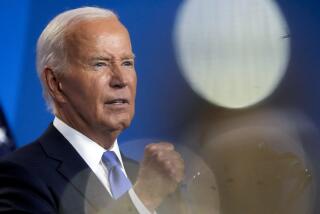Democrats Shouldn’t Dismiss Primary Idea
- Share via
A photo appeared in some newspapers last week that showed a polling place in Washington, D.C. It was like one of those Cold War era displays of the effects of the neutron bomb. The building was intact but it seemed that all the people had been vaporized and were nowhere to be seen. It was a melancholy panorama of the effects of a presidential primary system dubbed, in properly lethal terminology, as “front-loaded.”
Front-loaded and empty-ended would be a more complete description, because the decision by the parties and the state legislatures to move up the primaries in most of the more populous states to an earlier point in the primary season has been the greatest act of national disenfranchisement since Reconstruction.
Having the largest states, like California and New York, early in the primary process is like serving the chocolate cream pie as an appetizer and dishing up the broccoli for dessert. It is difficult to remember the last time New Jersey, with its June primary, had any impact at all on the choice of a nominee of either party. Until this year, when California’s primary was moved to March 7, the nation’s largest state had been essentially voiceless since 1968. But in righting that wrong, the party and state officials have simply changed the identities of the disenfranchised from Californians to North Carolinians and Hoosiers.
But help may be on the way in the form of a proposal from a Republican task force that has proposed letting the dozen smallest-population states go first in early March, followed the next month by 13 larger states and building up to a crescendo to a Super Tuesday in June, when the the demographic powerhouses would cast their votes. It is a plan that the Democrats should not dismiss.
The best argument for this plan is not that it boosts Wyoming’s morale, or that it puts Texas in its place. It is to maintain interest in the process, to motivate voters to participate and to get Americans to care about the process that eventuates in nomination. The whole idea behind the primary election when it was pioneered early in this century was to take the job of nominating out of the hands of the party bosses at the national conventions and place it with the people. A primary election schedule that ends in early March unfairly discriminates against those Americans who are unlucky enough to be casting their votes in May or June.
But there is more to commend the GOP plan than just equal treatment for all. By putting more small states at the head of the line, the proposal would have the beneficial effect of prolonging what is known as the “retail” phase of the campaign, which is so well exemplified by New Hampshire, where candidates meet voters in person and not solely in TV ads. It would, of course, be harder on the candidates, since as it stands now, after Iowa and New Hampshire, they encounter directly only the number of voters required for good television visuals.
Adopting the plan offered by the committee headed by former Republican Party Chairman Bill Brock would boost the chances of candidates from some of the smaller population states. It is possible, for example, that the presidential chances of Sen. Bob Kerrey (D-Neb.) would have been boosted if his state had voted early in 1992. And although the primary dice are not entirely loaded against the small-state politician--witness Bill Clinton’s success--the proposed reform would seem to open the possibility of a more interesting cast of characters.
The plan includes New Hampshire in the early group, although it would have to share primacy with 11 other small states. The Granite State has been so adamant about not sharing the honors of being the earliest primary state that it alone could scuttle the plan. But it is California, the biggest prize of all, whose opposition to this reasonable proposal could well sink it. The reaction of California’s Secretary of State Bill Jones was essentially to say, “No way.” Jones, the force behind the March primary in California, reportedly argued that taking the early advantage away from the big states would simply hand the decision to the sparsely populated states, even though the plan still has a majority of the delegates being chosen in the late big-state primaries.
Presidential candidates, when asked why they campaign exclusively in early-primary states regardless of size, can only respond as Willie Sutton famously did when asked why he robbed banks: “Because that’s where the money is.” It’s a good rule if you are a bank robber, but presidential candidates ought to be animated by a loftier principle.
More to Read
Get the L.A. Times Politics newsletter
Deeply reported insights into legislation, politics and policy from Sacramento, Washington and beyond. In your inbox twice per week.
You may occasionally receive promotional content from the Los Angeles Times.










